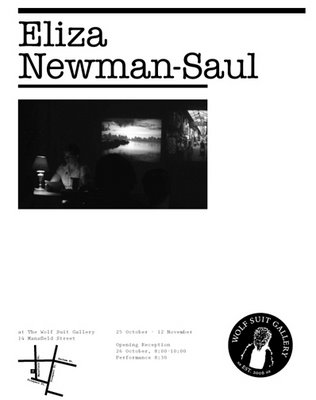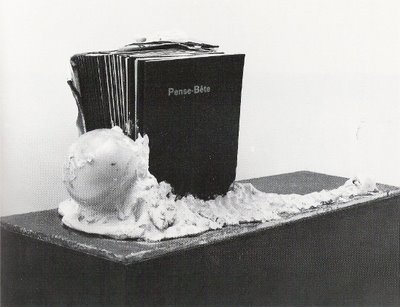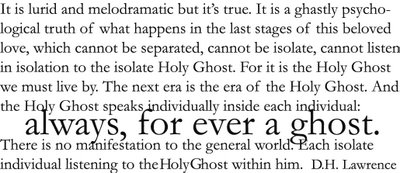Friday, October 27, 2006
Beheading
"They're horrible here with their obsession for beheading. I'm surprised anyone's survived."
--Jean-Luc Godard's Notre Musique
"A young German-Catholic woman said in 1993: 'The dream of the individual is to be two, the dream of the State is to be one'. They cut off her head."
--Jean-Luc Godard's Notre Musique
"The other argument often used to suppress pictures cites the rights of relatives. When a weekly newspaper in Boston briefly posted online a propaganda video made in Pakistan that showed the 'confession' (that he was Jewish) and subsequent ritual slaughter of the kidnapped American journalist Daniel Pearl in Karachi in early 2002, a vehement debate took place in which the right of Pearl's widow to be spared more pain was pitted against the newspaper's right to print and post what it saw fit and the public's right to see. The video was quickly taken offline. Notably, both sides treated the three and a half minutes of horror as a snuff film. Nobody could have learned from the debate that the video had other footage, a montage of stock accusations (for instance, images of Ariel Sharon sitting with George W. Bush at the White House, Palestinian children in Israeli attacks), that it was a political diatribe and ended with dire threats and a list of specific demands--all of which might suggest that it was worth suffering through (if you could bear it) to confront better the particular viciousness and intransigence of the forces that murdered Pearl. It is easier to think of the enemy as just a savage who kills, then holds up the head of his prey for all to see."
--Susan Sontag's Regarding the Pain of Others
--Jean-Luc Godard's Notre Musique
"A young German-Catholic woman said in 1993: 'The dream of the individual is to be two, the dream of the State is to be one'. They cut off her head."
--Jean-Luc Godard's Notre Musique
"The other argument often used to suppress pictures cites the rights of relatives. When a weekly newspaper in Boston briefly posted online a propaganda video made in Pakistan that showed the 'confession' (that he was Jewish) and subsequent ritual slaughter of the kidnapped American journalist Daniel Pearl in Karachi in early 2002, a vehement debate took place in which the right of Pearl's widow to be spared more pain was pitted against the newspaper's right to print and post what it saw fit and the public's right to see. The video was quickly taken offline. Notably, both sides treated the three and a half minutes of horror as a snuff film. Nobody could have learned from the debate that the video had other footage, a montage of stock accusations (for instance, images of Ariel Sharon sitting with George W. Bush at the White House, Palestinian children in Israeli attacks), that it was a political diatribe and ended with dire threats and a list of specific demands--all of which might suggest that it was worth suffering through (if you could bear it) to confront better the particular viciousness and intransigence of the forces that murdered Pearl. It is easier to think of the enemy as just a savage who kills, then holds up the head of his prey for all to see."
--Susan Sontag's Regarding the Pain of Others
The imaged Word...
The imaged Word, it is, that holds
Hushed willows anchored in its glow.
It is the unbetrayable reply
Whose accent no farewell can know.
--Hart Crane, from Voyages XI
Hushed willows anchored in its glow.
It is the unbetrayable reply
Whose accent no farewell can know.
--Hart Crane, from Voyages XI
Monday, October 23, 2006
WJ on Mysticism (Quote)
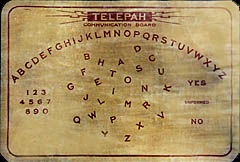 a la Betsy Bonner...
a la Betsy Bonner..."But with the memories, concepts, and conational [sic] states, the case is different. Nobody knows exactly how far we are 'marginally' conscious of these at ordinary times, or how far beyond the 'margin' of our present thought trans-marginal consciousness of them may exist. There is at any rate no definite bound set between what is central and what is marginal in consciousness, and the margin itself has no definite bound *a parte foris*. It is like the field of vision, which the slightest movement of the eye will extend, revealing objects that always stood there to be known. My hypothesis is that a movement of the threshhold downwards will similarly bring a mass of subconscious memories, conceptions, emotional feelings, and perception of relation, etc. into view all at once; and that if this enlargement of the nimbus that surrounds the sensational present is vast enough, while no one of the items it contains attracts our attention singly, we shall have the conditions fulfilled for a kind of consciousness in all essential respects like that termed mystical....
In each of the three cases, the experience broke in abruptly upon a perfectly commonplace situation and lasted perhaps less than two minutes. In one instance I was engaged in conversation, but I doubt whether the interlocuter noticed my abstraction. What happened each time was that I seemed all at once to be reminded of a past experience; and this reminiscence, ere I could conceive or name it distinctly, developed into something further that belonged with it, this in turn into something further still, and so on, until the process faded out, leaving me amazed at the sudden vision of increasing ranges of distant fact of which I could give no articulate account. The mode of consciousness was perceptual, not conceptual--the field expanding so fast that there seemed no time for conception or identification to get in its work. There was a strongly exciting sense that my knowledge of past (or present?) reality was enlarging pulse by pulse, but so rapidly that my intellectual process could not keep up the pace. The *content* was thus entirely lost to retrospection--it sank into the limbo into which dreams vanish as we gradually awake. The feeling--I won't call it belief--that I had had a sudden *opening*, had seen through a window, as it were, distant realities that incomprehensibly belonged with my own life, was so acute that I can not shake it off to-day."
from William James' "A Suggestion About Mysticism"
Sunday, October 22, 2006
True Crop

for Ed Ruscha,
literally hallucinating
The point was
this floating
lacustrine feeling
surrounded by
the sea
meaning what you say
letters stray
these letters how much
information would
you like
how much would it take
to cover the world
a simple lamp hangs
a very simple lamp
we mistake
this lamp for another
floating object
this is a copy of the world
minus a few aspects
which no longer count.
*
TOTAL
WAR
Excelsior
DIVISION
PURE SPIRITS
COVER THE
WORLD
from the air
*
With all percepts
Who gets to be an artist what gets to be art
In the sun perchance
All the stations
A flight from stations intent on record
Containing everything
But the sun covering the sun in evidence.
*
"like a speech delivered on no matter"
"with all kinds of delays"
*
Here's a photo
Of a car and here's
A photo of a photo
Of a car and here's
A drawing of that photo
Of the car now where's
The car?
THE END
Saturday, October 21, 2006
3 Revisions

Next Breath Best Breath
--for Arthur Russell
Your dreams come near to you
For the child distinguishes
Between inside outside clouds
Arguments like music we are here
Things can't help happening where
There was something was something
Proceeding to parse your brow
Your bow given to Bach the lyric
Must return nearer than thought.
*
To Edvard Munch
Scratch out all but her literal whisper
The kerchief blood to paint blood paint
To erase all face her hands all details
What life corrupts to erase the literal paint
Scratch out or cover the details evoke the literal
Death her then then process reverses.
*
Eruv I.
"Make peace not love."
--Amos Oz
The spirit of this converted private is not an inside abstract
It is the key of keys for mutual dwelling a mobility of ritual to discover
In potentia is to discover again ourselves lifting what must be
Transportable as string a version of commons shifting the signs
Grew out of graffiti heart to bright beams making a bubble
An effect of needing an inside outside outside to be a call to floating
Contracts towards mobile peace the place of this converted public.
Friday, October 20, 2006
Non-Site
The word defined “to see around” design
a premise control
people with few people
the ubiquity in all
self control containment isn’t this a technology it is
Easy Pass porn cookies GPS PS
what is moral
what is a moral compass
split sovereign my enemy my self my friend
space (vanishing
points) space (chaos) coercion (dungeon)
consent (imaginary)
“A real subjection is born from a ficticious relation”
interlocucter egged on
thinking in the dark thicket Prefect can’t see rivalry
continue to pass the ball paradigm unalarmed
hypnosis what is power power is given
by stupid smart knowledge
advantage of relation
a crit
can you think ways this image can be given to a politics what are some
images the revelation
of one’s making strikes art dumb
auratic character an atmosphere
art is an abstract cave viewed negatively in the distance
magic lends itself
to analysis positive because it expands sacred uniqueness
innovation a mixed
sense of loyalty in magic
out of books intimacy loss of intimacy
you can never cross the same reproduction twice
the politics
of chant every image
arrives
surrounded by print
Control Room craving blood reinforce exclusion
contexts clash Time Inc. Toyota || Iwo Jima
after the Towers fell
the media let half the call get thru.
a premise control
people with few people
the ubiquity in all
self control containment isn’t this a technology it is
Easy Pass porn cookies GPS PS
what is moral
what is a moral compass
split sovereign my enemy my self my friend
space (vanishing
points) space (chaos) coercion (dungeon)
consent (imaginary)
“A real subjection is born from a ficticious relation”
interlocucter egged on
thinking in the dark thicket Prefect can’t see rivalry
continue to pass the ball paradigm unalarmed
hypnosis what is power power is given
by stupid smart knowledge
advantage of relation
a crit
can you think ways this image can be given to a politics what are some
images the revelation
of one’s making strikes art dumb
auratic character an atmosphere
art is an abstract cave viewed negatively in the distance
magic lends itself
to analysis positive because it expands sacred uniqueness
innovation a mixed
sense of loyalty in magic
out of books intimacy loss of intimacy
you can never cross the same reproduction twice
the politics
of chant every image
arrives
surrounded by print
Control Room craving blood reinforce exclusion
contexts clash Time Inc. Toyota || Iwo Jima
after the Towers fell
the media let half the call get thru.
Lyrical Template (Non-Site)
"O where ha you been, Lord Randal, my son?
And where ha you been, my handsome young man?"
"I ha been at the greenwood; mother, mak my bed soon,
For I'm wearied wi hunting, and fain wad lie down."
"An wha met ye there, Lord Randal, my son?
And wha met ye there, my handsome young man?"
"O I met wi my true-love; mother, mak my bed soon,
For I'm wearied wi huntin, and fain wad lie down."
"And what did she give you, Lord Randal, My son?
And wha did she give you, my handsome young man?"
"Eels fried in a pan; mother, mak my bed soon,
For I'm wearied wi huntin, and fein wad lie down."
"And what gat your leavins, Lord Randal my son?
And wha gat your leavins, my handsome young man?"
"My hawks and my hounds; mother, mak my bed soon,
For I'm wearied wi huntin, and fein wad lie down."
"And what becam of them, Lord Randal, my son?
And what becam of them, my handsome young man?"
"They stretched their legs out and died; mother mak my bed soon,
For I'm wearied wi huntin, and fain wad lie down."
"O I fear you are poisoned, Lord Randal, my son!
I fear you are poisoned, my handsome young man!"
"O yes, I am poisoned; mother, mak my bed soon,
For I'm sick at the heart, and fain wad lie down."
"What d'ye leave to your mother, Lord Randal, my son?
What d'ye leave to your mother, my handsome young man?"
"Four and twenty milk kye; mother, mak my bed soon,
For I'm sick at the heart, and I fain wad lie down."
"What d'ye leave to your sister, Lord Randal, my son?
What d'ye leave to your sister, my handsome young man?"
"My gold and my silver; mother mak my bed soon,
For I'm sick at the heart, an I fain wad lie down."
"What d'ye leave to your brother, Lord Randal, my son?
What d'ye leave to your brother, my handsome young man?"
"My houses and my lands; mother, mak my bed soon,
For I'm sick at the heart, and I fain wad lie down."
"What d'ye leave to your true-love, Lord Randal, my son?
What d'ye leave to your true-love, my handsome young man?"
"I leave her hell and fire; mother mak my bed soon,
For I'm sick at the heart, and I fain wad lie down."
And where ha you been, my handsome young man?"
"I ha been at the greenwood; mother, mak my bed soon,
For I'm wearied wi hunting, and fain wad lie down."
"An wha met ye there, Lord Randal, my son?
And wha met ye there, my handsome young man?"
"O I met wi my true-love; mother, mak my bed soon,
For I'm wearied wi huntin, and fain wad lie down."
"And what did she give you, Lord Randal, My son?
And wha did she give you, my handsome young man?"
"Eels fried in a pan; mother, mak my bed soon,
For I'm wearied wi huntin, and fein wad lie down."
"And what gat your leavins, Lord Randal my son?
And wha gat your leavins, my handsome young man?"
"My hawks and my hounds; mother, mak my bed soon,
For I'm wearied wi huntin, and fein wad lie down."
"And what becam of them, Lord Randal, my son?
And what becam of them, my handsome young man?"
"They stretched their legs out and died; mother mak my bed soon,
For I'm wearied wi huntin, and fain wad lie down."
"O I fear you are poisoned, Lord Randal, my son!
I fear you are poisoned, my handsome young man!"
"O yes, I am poisoned; mother, mak my bed soon,
For I'm sick at the heart, and fain wad lie down."
"What d'ye leave to your mother, Lord Randal, my son?
What d'ye leave to your mother, my handsome young man?"
"Four and twenty milk kye; mother, mak my bed soon,
For I'm sick at the heart, and I fain wad lie down."
"What d'ye leave to your sister, Lord Randal, my son?
What d'ye leave to your sister, my handsome young man?"
"My gold and my silver; mother mak my bed soon,
For I'm sick at the heart, an I fain wad lie down."
"What d'ye leave to your brother, Lord Randal, my son?
What d'ye leave to your brother, my handsome young man?"
"My houses and my lands; mother, mak my bed soon,
For I'm sick at the heart, and I fain wad lie down."
"What d'ye leave to your true-love, Lord Randal, my son?
What d'ye leave to your true-love, my handsome young man?"
"I leave her hell and fire; mother mak my bed soon,
For I'm sick at the heart, and I fain wad lie down."
Tuesday, October 17, 2006
David Gatten at The Poetry Project

Last night David Gatten joined a cast of readers at St. Mark's Church to give a group reading of Fernando Pessoa's poem, "Maritime Ode". He also showed his recently completed films *What the Water Said* and *Shrimp Boat Log*.
*What the Water Said No.'s 4 & 5* presents a log (of sorts) of film stock as "treated" (i.e. battered, crumpled, and punctured) by the Atlantic Ocean, off the coast of the Carolinas. While others have made similar treatments before, Gatten's seems unique in its inclusion of soundtrack--which snaps, crackles, pops and even bangs--as well as his dating of the film as if the film were the Ocean's log-book or diary itself--what the water said being conveyed by the marks left on the soundtrack of the projected film stock.
If *What the Water Said* is a clever literalizing play off one of T.S. Eliot's sub-titles to "The Wasteland," *Shrimp Boat Log* is intriguing for its signalling or blinking form, the intermittances of various footage including shrimp boats crossing the center of the screen and leaving wakes, and brief glances at a log book. Like a less spastic version of Brakhage's lapsing-blinking camera, Gatten's camera and editing technique in *Shrimp Boat Log* give visual rhythm and form to coastal life--a native feeling for signals both perceptive and cultural, organic and technological. As in his nine-part *Secret History of the Dividing Line*, I also find Gatten's *Shrimp Boat Log* compelling in the way it gives particular shape to a viewer's reading experience--where often the viewer has mere seconds, if that, to read from a log, and so reads a few words at each viewing interval.
Sunday, October 15, 2006
Our Number of Wolves (The Fate of Number)
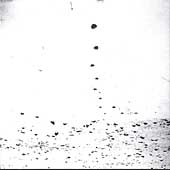
Our number of wolves
Say slay aloud the sun
Schism wait for grace
To arrive sound forms
Shine shine shine
Shone shone shone
Estray driven estray
Tones obey warp
Protect descent from dark
You want I want we want
Resonance seek tragic feet
Two gongs reap sheet metal
From the mind's place
Two notes two tones sweetly
We walked until the waves
Were sisterly out of a great
Darkness steps cocooned
Honey veiled heard myrrh
Gowns do flow sovereign
Red love less sighted
Than what actually sounds
Number lives in the head
Breath rings wreaths around
What petals steps desire words forge words
From cedar towers honey sips the bee
Hymen followed by attendants
Who'll measure her breath for breath
If anything were first tones would be fate
This simple number no fate destroys
The heart's breath two children lay
Down in the heart of white white face
Of hovering night life's a spherical
Music singing its single note to phase
If anything were first this would be first
To descend from the one from the one one intones
Two tones one note the simple petals adorn time
Singing life not only about it
Say we are word and meaning united
You are thought and I am sound.
The Fate of Number (Revision)
--for Alain Badiou & Gilles Deleuze
So the mind must make one and can't make one
So we must love one another and love the abstract
So this is a notion of what subjects are together an inter-subjective
Ground of love so there must always be
Love for the one mind so the mind is what we love
To the second degree so the eyes are the first sign
We see of the mind the eyes and their cancellations
So there are words a mind sees itself blindly.
Why can't one one be one one be
Why can't one one and one one be two
One and one only one no numericity
In the outside none inside the movement
Of the all so each multiplicity
Destroys number to save number.
So there are words a mind sees itself blindly
We see of the mind the eyes and their cancellations
To the second degree so the eyes are the first sign
Love for the one mind so the mind is what we love
Ground of love so there must always be the inter-subjective
So this is a notion of what subjects are together
So we must love one another and love the abstract
So the mind must make one and can't make one.
So the mind must make one and can't make one
So we must love one another and love the abstract
So this is a notion of what subjects are together an inter-subjective
Ground of love so there must always be
Love for the one mind so the mind is what we love
To the second degree so the eyes are the first sign
We see of the mind the eyes and their cancellations
So there are words a mind sees itself blindly.
Why can't one one be one one be
Why can't one one and one one be two
One and one only one no numericity
In the outside none inside the movement
Of the all so each multiplicity
Destroys number to save number.
So there are words a mind sees itself blindly
We see of the mind the eyes and their cancellations
To the second degree so the eyes are the first sign
Love for the one mind so the mind is what we love
Ground of love so there must always be the inter-subjective
So this is a notion of what subjects are together
So we must love one another and love the abstract
So the mind must make one and can't make one.
When that a wide wood was
"We are word and meaning united.
You are thought and I am sound."
*
"That is why this too must be the criterion for rejection or choice: whether you are willing to stand guard over someone else's solitude, and whether you are able to set this same person at the gate of your own depths, which he learns of only through what steps forth, in holiday clothing, out of the great darkness."
--Rainer Maria Rilke
You are thought and I am sound."
*
"That is why this too must be the criterion for rejection or choice: whether you are willing to stand guard over someone else's solitude, and whether you are able to set this same person at the gate of your own depths, which he learns of only through what steps forth, in holiday clothing, out of the great darkness."
--Rainer Maria Rilke
The Movement of Movement (Revision)
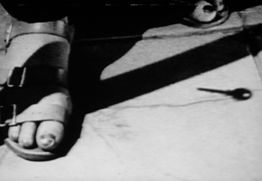
--for Maya Deren
The mother of us all mother is movement first movement
First as dance is naked the naked form of movement a space
Where things no longer can be put simply put is time
Transfigured for the body the body arrested transfigured
To rest in the edit cut cut to a dance on film is something
First as dance is naked the naked form of movement a space
Where things no longer can be put simply put is time
Transfigured for the body the body arrested transfigured
To rest in the edit cut cut to a dance on film is something
Where things no longer can be put simply put is time
Transfigured for the body the body arrested transfigured
To rest in the edit cut cut to a dance on film is something
Transfigured for the body the body arrested transfigured
To rest in the edit cut cut to a dance on film is something
Different a difference to edit this to fall to ascend
In grace some other affirmation the mother of us all born
Different a difference to edit this to fall to ascend
In grace some other affirmation the mother of us all born
In that movement first movement of movement the empty
Difference a difference to edit this to fall to ascend
In grace some other affirmation the mother of us all born
In that movement first movement of movement the empty
Body the body before the body was the body the body after
A difference different to edit this to fall to ascend
In grace some other affirmation the mother of us all born
In that movement first movement of movement the empty
Body the body before the body was the body the body after
The body was the body ever lightened by film and light.
Wednesday, October 11, 2006
All Eyes (Piece)
All eyes were tears
To hear soothsayers the better
All ears issue from
A shady place on the syllogism
Channels divide
Attention span from
Disinformation
Shock and awe from say
On the sets of consent.
*
"Fuck the people"
He wrote
The cogito is also
Something to be seized
They're vanished into
The capillary
Functioning of power
Multiplicity's
A fancy hung
On the nail of spectacle.
To hear soothsayers the better
All ears issue from
A shady place on the syllogism
Channels divide
Attention span from
Disinformation
Shock and awe from say
On the sets of consent.
*
"Fuck the people"
He wrote
The cogito is also
Something to be seized
They're vanished into
The capillary
Functioning of power
Multiplicity's
A fancy hung
On the nail of spectacle.
Tuesday, October 10, 2006
For Broodthaers
Monday, October 09, 2006
Sunday, October 08, 2006
Myung Mi Kim's *River Antes* (Review)

I have long wanted to address the work of Myung Mi Kim, whom I have been reading with delight and devoted interest for over a decade now. Her most recent work with Michael Cross' B-flo based Atticus / Finch Press provides me with an opportunity, albeit brief....
When a section from *River Antes* appeared in Cross Cultural Poetics a couple years ago, what struck me immediately about Kim's new work was not a syntactical or lyrical innovation-- a significant change in the language or content of the work per se-- but the unprecedented and abundant use of two punctuating marks: the double slash ("//"), as well as a mark I'm not sure the proper name of, but which appears as a kind of partition or staff: "|".
As early as Kim's book, *Under Flag*, and throughout her more recent books, *Dura* and *Commons*, the poet has struggled to express language as a time-inhering and shaping material. The ways she has successfully achieved this are quite various, if not innumerable. For starters, Kim expresses durational meaning through a singular use of the space of the page where the reader finds ample tabs and spacings between words: the poet also does so through grammars which stress the palpability of word tenses, and deictical words (words indicative of time, place, and subject); by using inchoate words, phonemes and morphemes, and illegibility to enact states of language both of acquisition (learning to speak a language) and the post-semantic; and in her extensive use of notebooks, where Kim continualy accretes materials for her composition process.
Although Kim has employed punctuating marks before in unconventional and often diacritical ways, I am interested in how significantly punctuation marks seem to factor in *River Antes* and shape the book's meaning. While I am sure that the "|" and double "|" marks delay a reading process-- that is, delay the eye as it reads and processes--I wonder if there is not a deeper import at stake in the use of the marks. Do they mark, for instance, an ontological rupture--difference, trauma? Are they marks of dis-*aster*--the disconstellating of stars, and thus fate and time? I take this to be a possible meaning of the mark in the following from *RA*:
[conjugate]
A dependent's call
A dependent cries out
A || marvel perceive
Two pages later, the mark sounds a very different sense to me as it seems to perform another kind of lapse: the time-lapse of a cinematic or photographic process as it reveals a social-biological one--the consumption of corn-on-the-cob:
corn | corncob
Kim's scoring is especially meaningful as corn is transformed suddenly into its waste product (corncob) through the phantom objectivity* of the jump-cutting mark. Elsewhere the marks "|" and "||" seem to act as partitions cleaving highly discrete, anti-grammatical word sequences. Are these partitioning marks in fact mirrors?

The mark acts here as a kind of visual and aural rest, if not also the transferential surface of an abandoned dialectics--"spar wanton drear dear forbid" obscuring "hold facing simple adore one"; and "rights tie wallow heaving cause" not having a reflection at all (thereby nothing to be (mis-)identified by unless by absentee itself?).
In *RA* I am also struck by how Kim's concern for duration *qua* articulation (articulation of economic, racial and gender-based oppressions; articulation of "natural" and cultural forces; articulation of the interpollated and language-bearing self undergoing world) is given possibly its most creative book form to date. Through the poet's collaboration with her publisher, Michael Cross, the two have arrived at a form that not only treats Kim's hard-earned words elegantly (as all of her books to date have done), but that may possibly further the poet's project in book form.
Such an innovation becomes most clear in the pages of *RA* that fold out to three separate pages. In these fold-out "triptychs" there is a terrific sense of simultaneity as one scans all three "panels" at once, taking in the diversity of Kim's exquisite word scores and shapes. Among these pages are a variety of forms: on four of the pages the type is centered; on four others discrete words with spaces between them are divided by the mark "||" [as in the above]. On a page I find particularly stunning, Kim has arranged words that have been made partially illegible through photo-copy. In the center panel of my favorite of the five fold-outs the mark "|" and slash marks cascade down the page interrupted by periods and limited spacing, as if the punctuation marks from the book had conspired to form a Concrete poem. In this condensation of markings Kim provides a playful reminder of her ongoing preoccupation as a poet: to relate language itself as a time-based, and thus socially informed, process.
*"phantom objectivity" is a term used by Georg Lukacs to indicate a circumstance in which producer and produced are no longer related in a process, that are, therefore, abstract in their reification.
Wars I have not seen (Piece)
On my screen of kills
I can't remember
The precision bombs of September
Or was it January
1991 when
Global hegemonic strategy
Swept reality
Bricks turned to glimmering coins
While mushrooms metonymically
Displaced the body count
Repressing a distant present
Of slaughter
I can't remember
The precision bombs of September
Or was it January
1991 when
Global hegemonic strategy
Swept reality
Bricks turned to glimmering coins
While mushrooms metonymically
Displaced the body count
Repressing a distant present
Of slaughter
To Themiscyra
"Penthesilea: Son of the Neriad!
You will not follow me to Themiscyra?
You will not follow me to that fair temple
That rises tall among the oaks?
Come here, I haven't told you everything..."*
What marble
Eyes cry
True tears
For stone
Heart's mind
Whips legions
From lips
Their tears
For you
Unsubstitutable
Will we meet
At my temple
Or yours
Penthesilea
Resurrected
In bed
Your hand
Was my thigh
Heart's eye
Evens the score.
Come here
You haven't
Told me
Everything come
Here to
Themiscyra you
Haven't told
Me everything
My precious
Friend I
Haven't told
You everything
To Themiscyra
We go
My precious
Friend I
Haven't told
You everything
I haven't
Told you
Everything for
My temple
For my
Temple for
The sake
Of all
Homelands
I haven't
Told you
Of our
Legions slaying
Identity
My precious
Friend another
Temple rises
Even taller.
*from Kleist's *Penthesilea*, trans. Joel Agee.
You will not follow me to Themiscyra?
You will not follow me to that fair temple
That rises tall among the oaks?
Come here, I haven't told you everything..."*
What marble
Eyes cry
True tears
For stone
Heart's mind
Whips legions
From lips
Their tears
For you
Unsubstitutable
Will we meet
At my temple
Or yours
Penthesilea
Resurrected
In bed
Your hand
Was my thigh
Heart's eye
Evens the score.
Come here
You haven't
Told me
Everything come
Here to
Themiscyra you
Haven't told
Me everything
My precious
Friend I
Haven't told
You everything
To Themiscyra
We go
My precious
Friend I
Haven't told
You everything
I haven't
Told you
Everything for
My temple
For my
Temple for
The sake
Of all
Homelands
I haven't
Told you
Of our
Legions slaying
Identity
My precious
Friend another
Temple rises
Even taller.
*from Kleist's *Penthesilea*, trans. Joel Agee.
Subscribe to:
Posts (Atom)

